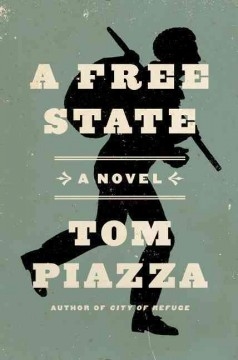by Andrew Hedglin
 A Free State by Tom Piazza has a great title. It might not jump out at you on the shelf, but trust me, it’s great. Back when I took classes teaching me the craft of poetry, the thing I enjoyed most, besides playing with the musicality of language, was finding a phrase that meant many things without being too self-conscious about it.
A Free State by Tom Piazza has a great title. It might not jump out at you on the shelf, but trust me, it’s great. Back when I took classes teaching me the craft of poetry, the thing I enjoyed most, besides playing with the musicality of language, was finding a phrase that meant many things without being too self-conscious about it.
That’s what this title is—and that’s what the book is: highly artful while remaining accessible. Short, but with a lot to see. What does a “free state” mean? Let me count the ways:
1) a free state – a term you might recognize form social studies class. One of the states in the American union that outlawed slavery before the Civil War. In this case: Pennsylvania (specifically Philadelphia), 1855. This is where we find our two protagonists: Henry Sims, a runaway slave from Virginia, and James Douglass, a former farm-boy who literally ran away with the circus and is now managing a blackface minstrel music revue.
2) a free state – the freedom from life’s banality that James Douglass finds in musical performance. Douglass was raised on a hardscrabble Pennsylvania farm in a household that reminds me of a line mentioned in the John D. MacDonald biographies on the back of all the Travis McGee novels: “Imagination was frivolity and frivolity was not on the agenda.” One day when he sneaks into a minstrel show by Joel Walker Sweeney, that’s it for him.
He follows music as far as it will take him from the farm, through the circus, to the theaters of Philadelphia. When he describes this journey to Henry, saying he felt “as if [he] had been freed from a life of oppressive servitude,” Henry can only answer “with a look half amused and half derisive…‘Your eloquence is admirable.”
3) a free state – Henry’s condition, real only in each moment that he exists with it, of being escaped from chattel slavery. Henry is a prodigious, electrifying musical talent that grants him privilege that transcends his race—up to a point—on both the Virginia plantation where he is from and the Philadelphia stage he performs on in defiance of the law.
The impetus for Henry’s flight from the plantation is not physical brutality but emotional betrayal by his master; although there is plenty of evidence of the former where’s he from. Like Douglass, he is also brought to a higher place by music, but with that higher place comes higher risk—of being brought back into enslavement, even death, as the savagely violent slave hunter Tull Burton fanatically pursues him.
Henry’s journey is particularly fascinating and complexly imagined as he struggles to run from the past he hated and yet misses; to play the music of his servitude and not be ashamed. The abolitionists in Philadelphia tell him to put the banjo away: “They said it was a slave instrument, and he had thought, I am nobody’s slave.”
Douglass and Henry meet and agree on a mutually beneficial agreement wherein Douglass provides the opportunity and Henry provides the talent. From there, both men—and the reader—consider the stakes as they navigate questions of love, trust, and moral responsibility. They both have to decide if they find something more valuable than their beloved and hard-won freedoms. The stakes are so high and consequences so real it is easy to forget Douglass and Henry are both no older than their early twenties, and are still growing in their personhood.
The final chapter is particularly stirring, told from the perspective of a recognizable, important historical figure. This anecdote is the antidote to believing that the story, Henry’s story especially, ends with the novel itself. Henry’s final song is haunting, much like the novel itself is, lingering with you long after you receive its final words.


Comments are closed.